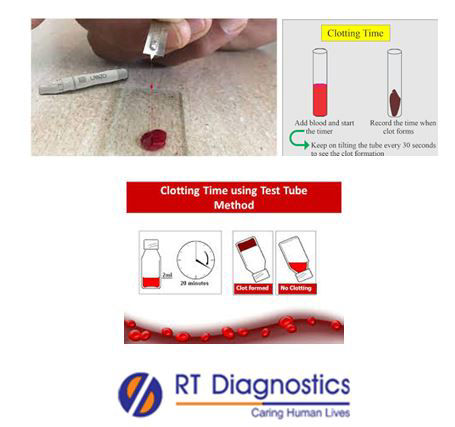Clotting time:
Why Clotting time Test?
CLINICAL INFORMATION
Prothrombin time (PT) is a blood test that measures the time taken to form a blood clot (clotting time during bleeding). PT also helps to check for bleeding disorders. PT is also known as a pro-time test, international normalized ratio (INR) test, etc. INR is calculated from a PT result and is used to monitor anticoagulant drugs such as warfarin (blood-thinning medication prescribed for deep vein thrombosis, atrial fibrillation, pulmonary embolism, presence of artificial valves, antiphospholipid syndrome, heart attacks, and other cardiovascular diseases). Prothrombin time is a test used to help detect and diagnose bleeding disorders and/or excessive clotting disorders. PT test is performed along with Partial Thromboplastin Time (PTT)/activated Partial Thromboplastin Time (aPTT) and together they assess the amount and function of proteins called coagulation factors that plays a key role in coagulation cascade in blood clotting mechanism.
Clotting time test or also called activated clotting time helps to monitor treatment with a high dose of heparin before, during, and for short time after medical or surgical procedures that need prevention of blood clotting eg. Heart bypass surgery, coronary angioplasty, dialysis, etc. Low PT indicates blood clots more quickly than normal eg. Supplements with high vitamin K, medications such as hormone replacement therapy like birth control pills, hormone replacement therapy, primary thrombocythemia (bone marrow produces too many platelets), etc, while high PT indicates that blood takes longer time to form clot eg in conditions such as in liver cirrhosis (End-Stage Liver Diseases screening needs a scoring system for assessing the severity of chronic liver disease condition), fibrinogen dysfunction, vitamin K deficiency, deficiency of coagulation factors eg. Factor VII deficiency, bleeding disorder – hemophilia (hereditary disorder -inability to form clot during bleeding injuries), thrombocytopenia. PT test may be ordered in patients with clinical manifestations of unexplained bleeding or easy bruising, nose bleeds, bleeding gums, blood clots in arteries and veins, DIC, DVT, liver diseases, dengue, etc. Indication for PT and PTT are performed in follow-up or abnormal results that include conditions such as platelet count (either abnormal increase or decrease), fibrinogen testing (low level of fibrinogen or dysfunction of fibrinogen that causes prolonged PT), coagulation factor test (test measures the activity of coagulation factors that determines its function eg factor XII, prekallikrein, high molecular weight kininogen – HMWK deficiency, etc),Von Willebrand factor (decrease or absence), vascular abnormalities, blood dyscrasias, bone marrow abnormalities and tumors, lupus anticoagulant testing – to further investigate the cause of prolonged PT and/or PTT tests. Complications of blood clot formation leading to thrombosis in the heart (causing myocardial infarction) leading to heart attacks, lungs (pulmonary embolism), brain (stroke), etc. Other associated tests include CBC, assay for clotting factors i.e factor V, fibrinogen test – thrombin time, platelet count, platelet function test to assess acquired platelet function defect, bleeding time, etc.

General Instructions:
Sample Requirement: Specimen - Blood sample collected from the vein. Test Preparation: None.
NOTE - Sample for specimen collections may vary based on the patient’s condition/cases according to the patient’s presenting complaints/signs or symptoms:
SPECIMEN REQUIREMENT (Special or Rare Cases) - As instructed and guided by Physician / Clinician / Pathologist / as per Laboratory’s requirements, according to procedures and protocols.
Sample Requirement: Blood Sample taken from the vein
Test Preparation: None
This Multi-Specialty Clinical Referral Laboratory RT DIAGNOSTICS provides precise and accurate tests with an extensive range of testing services to the medical centers to help in the diagnosis and identification of pathology in the test specimens for infectious diseases and also to evaluate the function of organ systems of the patient. It prevents further complications and helps to stabilize and restore health to near normalcy at the earliest without delay.



